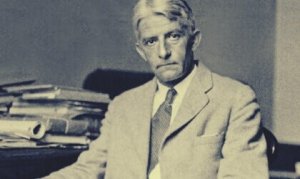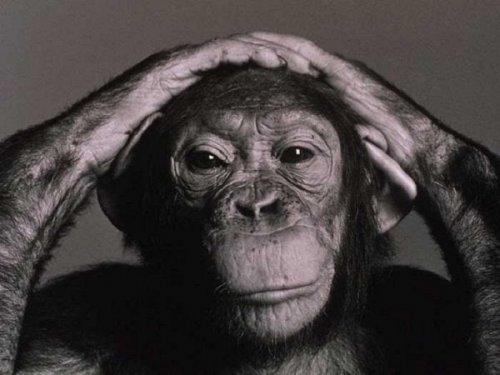Wolfgang Köhler: Intelligence and Chimpanzees

Wolfgang Köhler was one of the most renowned proponents of Gestalt psychology. He concerned himself with trying to explain one of the most important topics within this school of thought: learning. One of the most interesting aspects of his work is that a good portion of his postulates arose from the patient, long, and productive observation of chimpanzees.
This researcher lived during a time when people were trying to bring more scientific rigor to psychology. In the United States, behaviorist psychologists were slowly coming to control the entire field. This school of psychology believed that observable behavior was the only valid way to study psychological phenomena. Meanwhile, Gestalt psychology was favored in Europe. This type of psychology also sprang from laboratory work, but it sought phenomenological interpretation of its findings.

Wolfgang Köhler was one of the people who developed Gestalt psychology, along with Max Wertheimer and Kurt Koffka. Although he wasn’t the most renowned of that trio, he did contribute valuable elements for the advancement of the new school. That was his life and his work, in a nutshell.
“It would be interesting to inquire how many times essential advances in science have first been made possible by the fact that the boundaries of special disciplines weren’t respected… Trespassing is one of the most successful techniques in science.”
-Wolfgang Köhler-
The beginnings of Wolfgang Köhler
Wolfgang Köhler was born in Estonia on January 21st, 1887. He had one brother and many sisters. His father was a teacher and he tried to instill a love for knowledge and art in his children. When Wolfgang was only six years old, his family moved to Germany. He stayed there for a long time.
Wolfgang Köhler’s university education was relatively unique. First, he attended the University of Tübingen. Then, he went to Bonn and Berlin. Throughout his journey through higher education, he came into contact with various disciplines. Biology, physics, and psychology had a particular influence on him. He obtained a doctorate degree in the latter in 1909 from the Free University of Berlin.
Right after graduating, he started to work at the Institute of Psychology in Frankfurt. He first took on the position of assistant and later rose to become a professor. There, he met Max Wertheimer and Kurt Koffka.
The trio’s work became the Gestalt school of psychology. In 1912, he married an artist named Thekla Achenbach. A year later, he was selected as the director of the Tenerife Academy of Applied Sciences Primate Research Center in Preussen. His whole life changed from that point on.
Observing chimpanzees in Tenerife
Wolfgang Köhler was the first person to use chimpanzees in psychological research. Before, psychologists had only experimented with dogs and cats in order to learn about conditioning. Based on the fact that chimps are more closely related to humans, one of Köhler’s main goals was to see just how similar they were. On the other hand, he was also interested in discovering up to what point they were different regarding learning.
Wolfgang Köhler established the concept of “learning by insight” on the basis of his research. What this means is learning by repeated discernment based on a series of previous stimuli. He presented this concept in his work titled The Mentality of Apes, published in 1925. Here, he described many of the experiments he conducted in Tenerife.

Basically, Köhler made it difficult for the chimpanzees to get food that was right in front of them. At the same time, he placed tools in their environment that would allow them to overcome the obstacles. The researchers discovered that the monkeys were able to solve the problem. However, they didn’t do so in a linear fashion. In other words, they displayed some abrupt jumps in their reasoning and effort.
Köhler’s final years
World War I started during his stay in Tenerife. Many people speculated that Köhler might be spying for the British. In 1920, he left his work on the island and returned to Berlin. At that time, he was becoming more famous. As a consequence, academic centers the world over sought him out.
Wolfgang Köhler spoke publicly against socialism. That’s why, when World War II started, he emigrated to the United States. He feared for his life during that conflict. After that, several prestigious universities, such as Princeton and Dartmouth, hired him to teach. In 1959, he became president of the APA (the American Psychological Association).
Köhler died in 1967 in New Hampshire. Psychologists still use his concept of insight. His most renowned works are The Mentality of Apes (1925), Dynamics in Psychology (1940), and Gestalt Psychology (1947).
Wolfgang Köhler was one of the most renowned proponents of Gestalt psychology. He concerned himself with trying to explain one of the most important topics within this school of thought: learning. One of the most interesting aspects of his work is that a good portion of his postulates arose from the patient, long, and productive observation of chimpanzees.
This researcher lived during a time when people were trying to bring more scientific rigor to psychology. In the United States, behaviorist psychologists were slowly coming to control the entire field. This school of psychology believed that observable behavior was the only valid way to study psychological phenomena. Meanwhile, Gestalt psychology was favored in Europe. This type of psychology also sprang from laboratory work, but it sought phenomenological interpretation of its findings.

Wolfgang Köhler was one of the people who developed Gestalt psychology, along with Max Wertheimer and Kurt Koffka. Although he wasn’t the most renowned of that trio, he did contribute valuable elements for the advancement of the new school. That was his life and his work, in a nutshell.
“It would be interesting to inquire how many times essential advances in science have first been made possible by the fact that the boundaries of special disciplines weren’t respected… Trespassing is one of the most successful techniques in science.”
-Wolfgang Köhler-
The beginnings of Wolfgang Köhler
Wolfgang Köhler was born in Estonia on January 21st, 1887. He had one brother and many sisters. His father was a teacher and he tried to instill a love for knowledge and art in his children. When Wolfgang was only six years old, his family moved to Germany. He stayed there for a long time.
Wolfgang Köhler’s university education was relatively unique. First, he attended the University of Tübingen. Then, he went to Bonn and Berlin. Throughout his journey through higher education, he came into contact with various disciplines. Biology, physics, and psychology had a particular influence on him. He obtained a doctorate degree in the latter in 1909 from the Free University of Berlin.
Right after graduating, he started to work at the Institute of Psychology in Frankfurt. He first took on the position of assistant and later rose to become a professor. There, he met Max Wertheimer and Kurt Koffka.
The trio’s work became the Gestalt school of psychology. In 1912, he married an artist named Thekla Achenbach. A year later, he was selected as the director of the Tenerife Academy of Applied Sciences Primate Research Center in Preussen. His whole life changed from that point on.
Observing chimpanzees in Tenerife
Wolfgang Köhler was the first person to use chimpanzees in psychological research. Before, psychologists had only experimented with dogs and cats in order to learn about conditioning. Based on the fact that chimps are more closely related to humans, one of Köhler’s main goals was to see just how similar they were. On the other hand, he was also interested in discovering up to what point they were different regarding learning.
Wolfgang Köhler established the concept of “learning by insight” on the basis of his research. What this means is learning by repeated discernment based on a series of previous stimuli. He presented this concept in his work titled The Mentality of Apes, published in 1925. Here, he described many of the experiments he conducted in Tenerife.

Basically, Köhler made it difficult for the chimpanzees to get food that was right in front of them. At the same time, he placed tools in their environment that would allow them to overcome the obstacles. The researchers discovered that the monkeys were able to solve the problem. However, they didn’t do so in a linear fashion. In other words, they displayed some abrupt jumps in their reasoning and effort.
Köhler’s final years
World War I started during his stay in Tenerife. Many people speculated that Köhler might be spying for the British. In 1920, he left his work on the island and returned to Berlin. At that time, he was becoming more famous. As a consequence, academic centers the world over sought him out.
Wolfgang Köhler spoke publicly against socialism. That’s why, when World War II started, he emigrated to the United States. He feared for his life during that conflict. After that, several prestigious universities, such as Princeton and Dartmouth, hired him to teach. In 1959, he became president of the APA (the American Psychological Association).
Köhler died in 1967 in New Hampshire. Psychologists still use his concept of insight. His most renowned works are The Mentality of Apes (1925), Dynamics in Psychology (1940), and Gestalt Psychology (1947).
All cited sources were thoroughly reviewed by our team to ensure their quality, reliability, currency, and validity. The bibliography of this article was considered reliable and of academic or scientific accuracy.
Köhler, W., & Crespo, J. C. G. (1989). Experimentos sobre la Inteligencia de los Chimpancés: con un apéndice sobre la Psicología del Chimpancé. Debate.
This text is provided for informational purposes only and does not replace consultation with a professional. If in doubt, consult your specialist.







